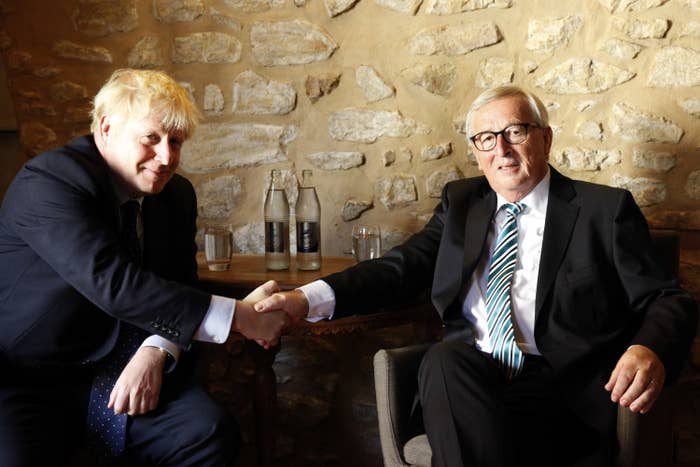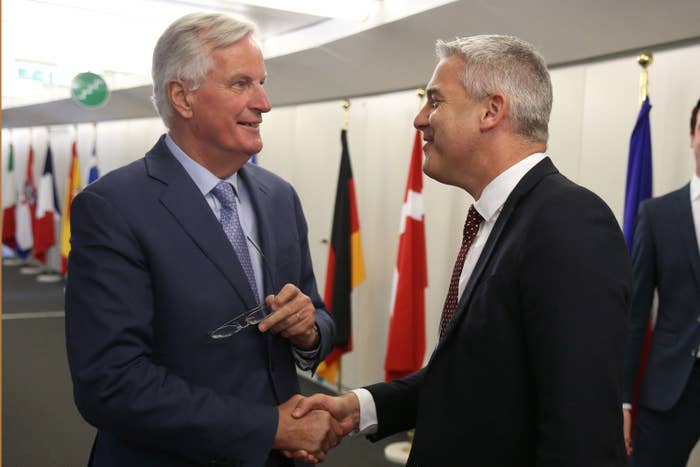
European officials say the UK’s proposals to get around the issue of the Northern Ireland backstop are just “concepts” that Britain would want to develop after Brexit and so should be “openly and clearly discarded”, according to a diplomatic note seen by BuzzFeed News.
The note is from a meeting on Friday between EU officials and diplomats from the 27 member states. It comes after the UK government sent the EU three documents earlier this week covering food and agriculture as well as sanitary and phytosanitary measures (known as SPS), customs, and manufactured goods.
The three “non-paper” — jargon for informal — documents outlined in writing for the first time prime minister Boris Johnson’s ideas on how to get around the issue of the backstop, the insurance policy included in the withdrawal agreement that guarantees that the border between Northern Ireland and the Republic of Ireland remains open after Brexit in all circumstances and scenarios, while also protecting the integrity of the EU’s single market.
Johnson has repeatedly pledged to ditch the backstop and replace it with alternative arrangements, and to leave the EU on Oct. 31 with or without a deal.
The EU and the 27 governments have consistently been clear that any such alternatives would need to meet all the requirements of the backstop and would have to be legally operative.
The three documents were labelled “HMG property”, and the British government asked for them not to be forwarded onto member states.
EU diplomats were told on Friday that the SPS paper is “not detailed”. The one-pager sets out the scope of a single regulatory regime north and south of the Irish border for food and agriculture and includes an annex listing two sets of legislation. The first list is of EU rules that would apply to Northern Ireland after Brexit obviating the need for border checks. The second list outlines EU legislation that wouldn’t apply, requiring checks to take place away from the border.
The other documents add nothing to what the UK has described in recent meetings, the diplomats were then told. On customs, the UK is not proposing legally operative solutions but concepts that would need to be further developed after Brexit during a transition period.
The French representative at the briefing said the idea the 27 could agree on general concepts to be developed during the transition should be “clearly and openly discarded”. The same diplomat stated that a legally operative solution was required.
The UK acknowledged that there would be a customs and regulatory border in this scenario, and noted that controls would take place at the premises of companies or inland, away from the border. Britain is also proposing to work on developing new technologies to assist in the endeavour, and to adopt and adapt a series of procedures, such as trusted trader schemes.
EU officials told the member states that some of the ideas the UK was proposing were not compatible with the bloc’s customs code and EU law.

The 27 were also informed on talks that took place earlier in the day between the Brexit secretary Steve Barclay and the EU’s chief negotiator Michel Barnier.
Barclay repeated the main points of a punchy speech he gave in Madrid on Thursday — the same day the UK proposals were submitted — stating that the backstop must go and a solution should be found during the transition period. He also suggested that the UK had given ground, citing SPS as an example, and the EU should do the same.
The EU has consistently said that without a withdrawal agreement there will be no transition period.
The diplomatic note states that Barnier made clear that he disagreed with Barclay’s assessment, and noted that the UK was “backtracking” on the withdrawal agreement — the UK’s terms of departure negotiated by Theresa May — and the onus was on Britain to come up with solutions.
Johnson’s chief EU adviser, David Frost, then explained that the UK had yet to set out its full approach and that further papers outlining this would be shared with the EU at the “right moment”. Barnier reiterated that the bloc was open to looking at alternatives, but these needed to be legally operative solutions that come into force after the withdrawal agreement is ratified. The EU’s chief Brexit negotiator also reminded his UK counterparts that he was open to revising the political declaration, the framework outlining the future UK–EU relationship.
The status of talks doesn’t bode well for Johnson as he heads to the UN general assembly in New York where he will be meeting French president Emmanuel Macron, German chancellor Angela Merkel, Irish Taoiseach Leo Varadkar, and European Council president Donald Tusk.
A UK government source insisted the proposals were “serious and workable” and would avoid a hard border in Northern Ireland.
They continued: "As for the Commission, two months ago they said we couldn't reopen the withdrawal agreement and there was absolutely no alternative to the backstop. Now we are having detailed discussions.
"Leaks from Brussels on Twitter are par for the course. You can set your watch by them. What we're focused on is actually getting a deal in the room. We trust they'll do the same."
